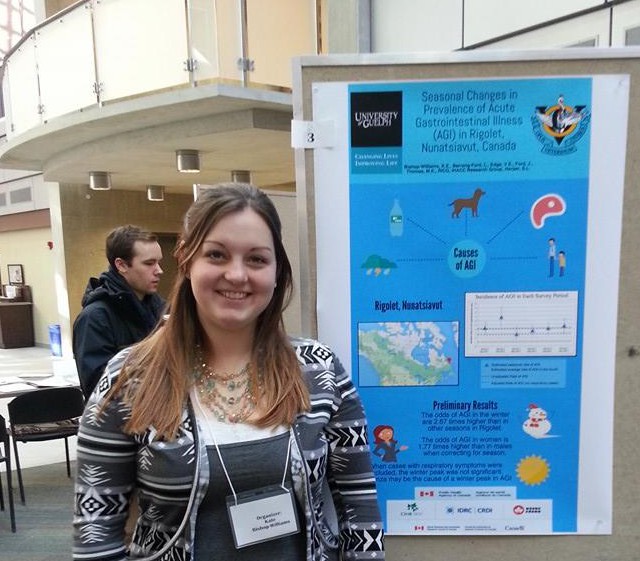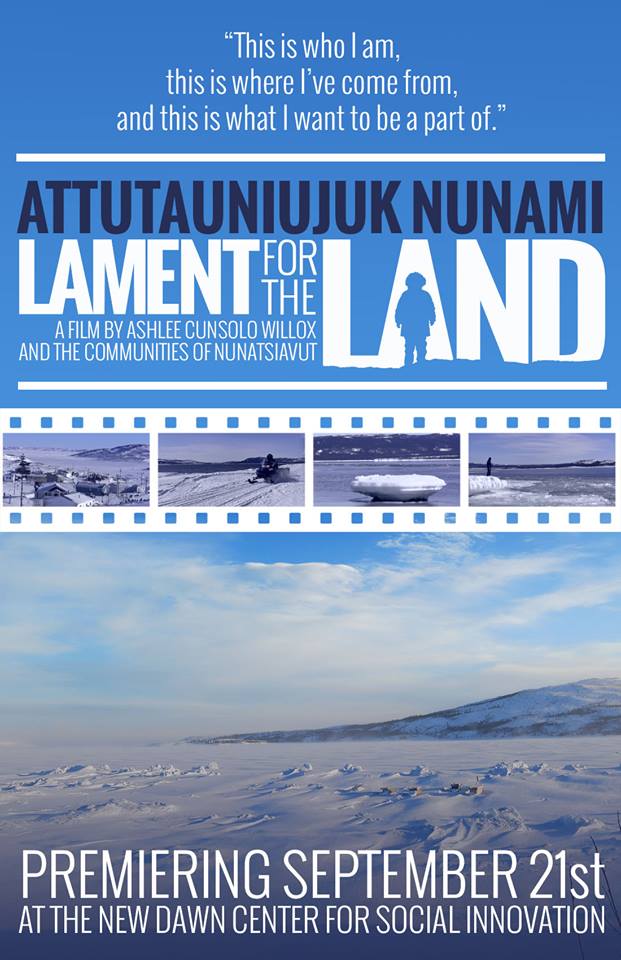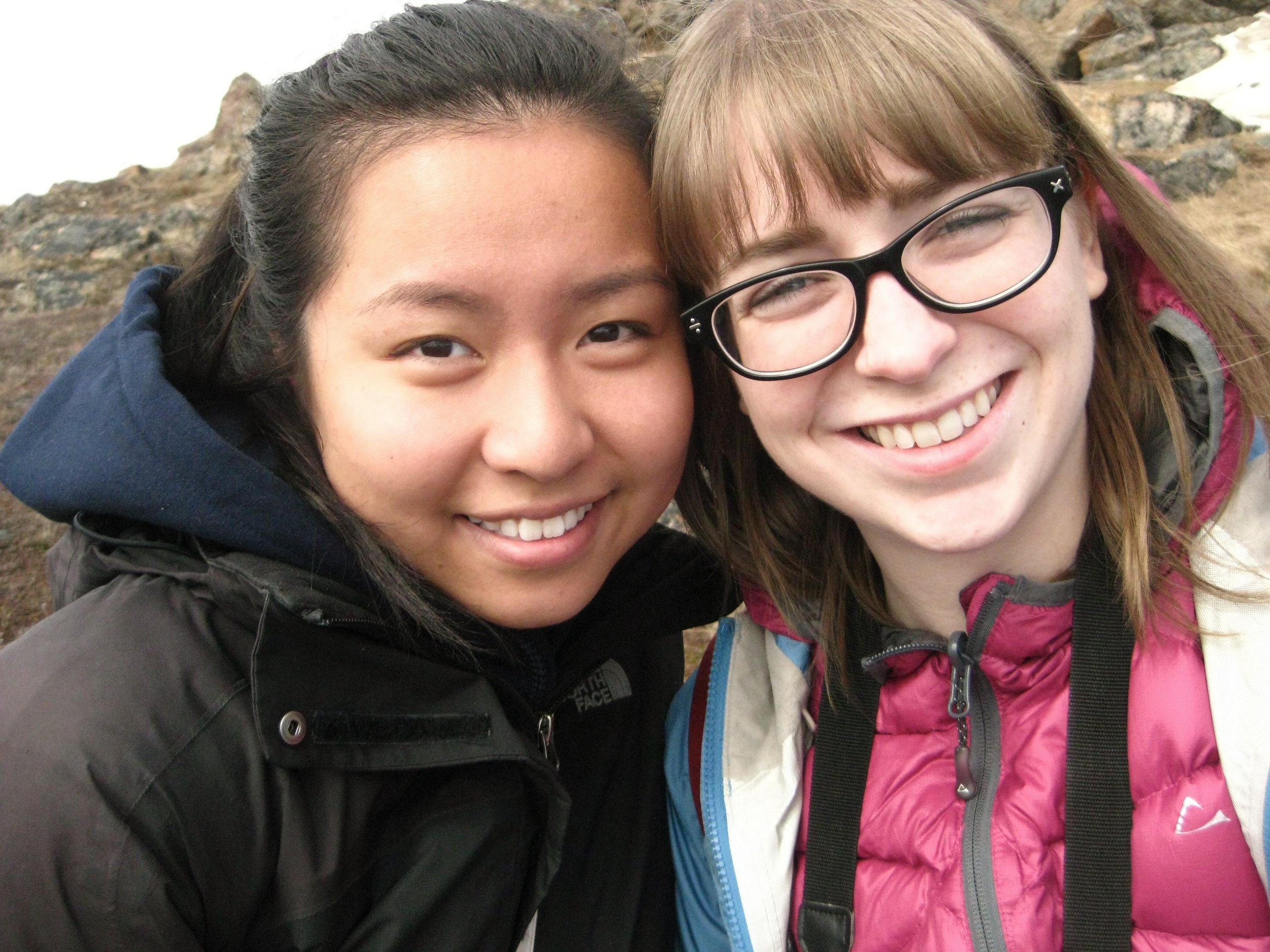A special congratulations to Vivienne Steele for winning a CoPEH-CAN Graduate Training Award ($1,000) to attend the 2015 EcoHealth Workshop and Field School. This year, the course is hosted in Montreal and is entitled "the health of the St Lawrence: from yesterday to today." Last year, lab members Ellen McDonald and Kate Bishop-Williams won the award. Congratulations Vivienne!
Kate Bishop-Williams Presents at the IECID in Spain
Kate Bishop-Williams presented her preliminary research findings from Rigolet, Nunatsiavut at the first ever International Conference on the Impact of Environmental Change on Infectious Diseases in Sitges, Spain on Monday, March 22, 2015. Kate’s research is entitled: Seasonal changes in prevalence of acute gastrointestinal illness and concurrent respiratory symptoms in Rigolet, Nunatsiavut, Canada. This research was supervised by: Dr. Sherilee Harper, Dr. Lea Berrang-Ford, and Dr. Victoria Edge, and conducted in collaboration with Dr. Kate Thomas, Dr. James Ford, Inez Shiwak and the IHACC research team. Kate’s trip was funded by a Latornell scholarship at the University of Guelph.
Rebecca visits National Geographic offices!
While on a trip to DC, Rebecca dropped by the National Geographic Society office to meet with representatives who helped fund her current research in Peru. It was a great opportunity to discuss her project, and to learn about the support offered by National Geographic to its grantees!
Kate Bishop gets UofG Media Coverage
"A grad poster presentation looking at prevalence of acute gastrointestinal illness (AGI) in Rigolet, Nunatsiavut, earned kudos at a recent Arctic Change conference. Kate Bishop-Williams, a PhD student in the Ontario Veterinary College’s Population Medicine department, placed second at the Arctic Change conference, an annual conference which brings together Arctic researchers, stakeholders and decision-makers... " Click here for the full article...
Infographics Symposium 2015
 Written by Kate Bishop-Williams
Today was the EcoHealth Community of Interest and the KTT/KMb Graduate Student Learning Circle’s first ever Infographic Symposium! More than 70 people joined us throughout the day, with 15 presenters and 10 excellent judges! What a great networking opportunity!
Written by Kate Bishop-Williams
Today was the EcoHealth Community of Interest and the KTT/KMb Graduate Student Learning Circle’s first ever Infographic Symposium! More than 70 people joined us throughout the day, with 15 presenters and 10 excellent judges! What a great networking opportunity!
The Symposium was funded primarily through a generous grant from the Student Life Enhancement Fund (SLEF), and in part also by the Centre for Public Health and Zoonoses (CPHAZ), the Institute for Community Engaged Scholarship (ICES) at the University of Guelph and the EcoHealth Community of Interest (EHCoI)- Guelph.
Fifteen graduate students representing 5 of the 6 colleges at the University of Guelph participated and presented exceptional infographics! Ten judges came to help us choose the winners (who won cash prizes!) and represented the Public Health Agency of Canada, CPHAZ, ICES, Ontario Ministry of Agriculture and Food (OMAF) and the private consulting sector! We were so grateful for their commitment of time and effort to this event!
Below, you can see the 2 infographics I presented, as well as the amazing organizing team (Andrea Lamarre, Megan Racey, Tylar Meeks and Ellen McDonald (not shown)) and the poster winners!
The infographics presented today will be PUBLISHED on the CPHAZ website soon, and will be invited to present at the CPHAZ Symposium in the spring!
Congratulations to all of our presenters, especially our winners! Thanks to the many people who stopped by, asked questions and voted!
New Publication: The Burden of Diarrheal Disease for Indigenous Ugandan Batwa
ABSTRACT: "Acute gastrointestinal illness (AGI) is an important public health priority worldwide. Few studies have captured the burden of AGI in developing countries, and even fewer have focused on Indigenous populations. This study aimed to estimate the incidence and determinants of AGI within a Batwa Pygmy Indigenous population in southwestern Uganda. A retrospective cross-sectional survey was conducted in January 2013 via a census of 10 Batwa communities (n = 583 participants). The AGI case definition included any self-reported symptoms of diarrhoea or vomiting in the past 2 weeks. The 14-day prevalence of AGI was 6·17% [95% confidence interval (CI) 4·2–8·1], corresponding to an annual incidence rate of 1·66 (95% CI 1·1–2·2) episodes of AGI per person-year. AGI prevalence was greatest in children aged < 3 years (11·3%). A multivariable mixed-effects logistic regression model controlling for clustering at the community level indicated that exposure to goats [odds ratio (OR) 2·6, 95% CI 1·0–6·8], being a child aged < 3 years (OR 4·8, 95% CI 1·2–18·9), and being a child, adolescent or senior Batwa in the higher median of wealth (OR 7·0, 95% CI 3·9–9·2) were significantly associated with having AGI. This research represents the first Indigenous community-census level study of AGI in Uganda, and highlights the substantial burden of AGI within this population."
Arctic Change 2014: Day 2
Reflection by Kate Bishop-Williams Wednesday was the first official day of the Arctic Change Conference, and it was my first time at an Arctic specific conference. We heard a variety of interesting opening plenary talks, in particular, a great introduction by the President of the Inuit Circumpolar Council, Mr. Duane Smith. There were exciting topical sessions on health in the North throughout the day. Chris Furgal and Eric Loring chaired these sessions. It was great to see a series of presentations related to various health topics in the Arctic. Inez Shiwak and I co-presented a talk in the afternoon, entitled “Seasonal Changes in Prevalence of Acute Gastrointestinal Illness in Rigolet, Nunatsiavut, Canada.” We were happy with our presentation, and I was excited to have had the opportunity to co-present for the first time!
In the evening, an excellent second poster session offered an opportunity to discuss the same project with individuals from the earlier session and others who were not able to join us previously. It was great to be busy with questions for the entire two hours, and the Infographic we had designed was well received!
In the evening, Mr. Peter Mansbridge of CBC's The National hosted the Arctic Inspiration Prize ceremony. The ceremony included incredible talents of artists. I was thrilled to see esteemed throat singer, and Polaris Prize winner, Tanya Tagaq! Congratulations to FOXY for their incredible win of the Arctic Inspiration Prize! It was a wonderful day and I am excited for the days to come!
Stephanie Masina presents at the Latornell Conservation Symposium
 Congrats to Stephanie for her poster presentation on chronic and acute gastrointestinal illness at the Latornell Conservation Symposium!
Reflections from Steph:
Congrats to Stephanie for her poster presentation on chronic and acute gastrointestinal illness at the Latornell Conservation Symposium!
Reflections from Steph:
On Wednesday, November 19th I had the opportunity to attend the 21st Latornell Conservation Symposium in Alliston, Ontario. For the first conference I’ve attended, it was a great experience! Some of the sessions that were particularly interesting for me included topics on water and community outreach. The first presentation discussed the importance of headwater streams and how hydrology is changing due to increasing urban development in Ontario. The second included the engagement of new audiences through storytelling, which was fascinating because it emphasized the use of storytelling as a way to build meaningful connections with communities about science.
I was also chosen to participate in my first student poster presentation with 18 other undergraduate and graduate students from universities in Ontario. I presented a poster describing my research project from this semester, titled Environmental Health Risks in the Canadian North: Acute and Chronic Gastrointestinal Illness in Rigolet, Nunatsiavut. Students and professionals in the environmental field found my project interesting and important in the context of climate change, and asked many insightful questions!
Overall, my poster presentation went well and I really enjoyed discussing my work. I’d like to thank Sheri and Kate for helping me prepare for this amazing experience!
Sierra Clark presents at McGill's Global Health Poster Fair
Congratulations Sierra! For more details:
For more details:
http://www.mcgill.ca/globalhealth/students/global-health-poster-fair
Rebecca's Fieldwork in Peru
Written by Rebecca Wolff In September, I returned from a great 2 weeks conducting my 4th year research project on water security in Shawi communities in the Peruvian Amazon. Specifically, my research focuses on learning about Shawi cosmology and beliefs related to water, as well as understanding what community members perceive to be the causes of diarrhea, a common symptom of waterborne illness. I visited the incredibly beautiful IHACC communities of the Puerto Porvenir and Nuevo Progresso, where I spent my free time enjoying the incredible views and searching for papayas and coconuts.
With help from my Shawi to Spanish translator Guillermo, we conducted interviews in the Shawi language with community key informants (traditional healers and health post technicians), as well as parents with children under the age of 10. As most community members drink Masato (a beverage made of fermented cassava) instead of water, part of the interview focused on understanding what water is used for and if it is consumed directly.
The interviews went really well! Community members were open and receptive to sharing their cultures and beliefs. Several community members also provided insightful feedback on how to disseminate future results. To thank the community for their participation, we prepared a communal breakfast and it was a great opportunity to spend time with community members outside of the interviews.
After meetings with the IHACC Peru team, I plan to use my results to assist the IHACC Peru team in designing interventions related to water security. As well, my qualitative research will be incorporated with future quantitative data investigating water quality in both Shawi communities.
A big thank you to the full IHACC team, in both Canada and Peru, for supporting my dream to do research in the Amazon. A special thank you to Alejandra Bussalleu, who helped in designing this project and providing preliminary data, and to Nancy Sullcapuma for accompanying me to the field!
Photos by Rebecca Wolff (with permission from community members to use the photos)
Emerging Commonalities: Laying Foundations for Future Work
Thursday, September 25, 2014 at 6:30pm MacNaughton Room 113, U of Guelph This participatory event is the third in a series related to convergence of Indigenous and scientific knowledge systems, and will explore further how we can develop comprehensive options to serve people and Earth, in fundamentally challenging times.
Dialogue guided by:
- Diane Hill (Katsitsawaks), Mohawk Nation, Bear clan, Six Nations of the Grand River Territory
- Sherilee Harper, Assistant Professor, Population Medicine
- Mackenzie Lespérance, Masters student, Plant Agriculture
Cost $5 at the door with proceeds to Ka’nikonhriyohtshera
More information at www.gryphlife.ca
SUMMARY OF THE ECOHEALTH 2014 CONFERENCE IN MONTREAL, QUEBEC, CANADA
 Written by Ellen McDonald
At the 5th Biennial Conference of the International Association for Ecology & Health (EcoHealth) 2014 I was met by an enormous wealth of knowledge through wonderful oral presentations, posters, and especially discussion with peers, mentors, and well, frankly academic celebrities. I presented a poster describing my research to date on The burden of acute gastrointestinal illness for Inuit in Iqaluit, Nunavut in an incredibly active poster session with much interest and many questions! From presentations on Lung function decline in rural women using fuel for wood cooking in Mexico to Health risk assessment of water sold in plastic bags in the city of Abidjan in Cote D’Ivoire- I was incredibly impressed with the breadth of EcoHealth applications in research. There were two sessions throughout the fantastic conference that stood above the rest. The first was a Plenary Panel with Emerging scholars and practitioners particularly Melanie Lemire from the University of Laval and her vision for the future in the north. A piece of her discussion highlighted the need to look critically at research in communities in the north - what do our role(s) as researchers become in those communities with enough research to create change in policy etc.? The second session that stood out was a poster-driven session including Exploring the health and wellbeing experiences in accessing nature within an urban healthcare setting by Rona Weerasuriya of Australia. I was reminded of a project that I once dreamed of creating in a rural community when I was around 15 years old, a project that would encourage community members to seek regular primary care by creating an environment that people would come to whether they were healthy or sick – such as a garden, or a café open to both the public and the patients as a waiting room. The project that Weerasuriya was assessing is a fantastic example of how this sort of thing could work – it was profoundly moving to see applications of EcoHealth in an unexpected way – simply looking at the bigger picture, and creating unity between and beyond disciplines really can be applied in a phenomenal array of situations. I left the conference thinking and dreaming – and I think that is the best kind of learning, the kind that expands your worldview.
Written by Ellen McDonald
At the 5th Biennial Conference of the International Association for Ecology & Health (EcoHealth) 2014 I was met by an enormous wealth of knowledge through wonderful oral presentations, posters, and especially discussion with peers, mentors, and well, frankly academic celebrities. I presented a poster describing my research to date on The burden of acute gastrointestinal illness for Inuit in Iqaluit, Nunavut in an incredibly active poster session with much interest and many questions! From presentations on Lung function decline in rural women using fuel for wood cooking in Mexico to Health risk assessment of water sold in plastic bags in the city of Abidjan in Cote D’Ivoire- I was incredibly impressed with the breadth of EcoHealth applications in research. There were two sessions throughout the fantastic conference that stood above the rest. The first was a Plenary Panel with Emerging scholars and practitioners particularly Melanie Lemire from the University of Laval and her vision for the future in the north. A piece of her discussion highlighted the need to look critically at research in communities in the north - what do our role(s) as researchers become in those communities with enough research to create change in policy etc.? The second session that stood out was a poster-driven session including Exploring the health and wellbeing experiences in accessing nature within an urban healthcare setting by Rona Weerasuriya of Australia. I was reminded of a project that I once dreamed of creating in a rural community when I was around 15 years old, a project that would encourage community members to seek regular primary care by creating an environment that people would come to whether they were healthy or sick – such as a garden, or a café open to both the public and the patients as a waiting room. The project that Weerasuriya was assessing is a fantastic example of how this sort of thing could work – it was profoundly moving to see applications of EcoHealth in an unexpected way – simply looking at the bigger picture, and creating unity between and beyond disciplines really can be applied in a phenomenal array of situations. I left the conference thinking and dreaming – and I think that is the best kind of learning, the kind that expands your worldview.
Poster Reference: McDonald, M.E., Harper, S.L., Edge, V.L., Ford, J., Thomas, M.K., IHACC Research Team, & Papadopoulos, A. (2014, August). The burden of acute gastrointestinal illness for Inuit in Iqaluit, Nunavut, Canada. Poster session presented at the 5th Biennial Conference of the International Association for Ecology & Health (EcoHealth 2014) at the Université du Québec à Montréal Montreal, Quebec, Canada.
Stories from the International EcoHealth Conference, 2014 in Montreal, Canada
 Written by Kate Bishop-Williams, Research Assistant, IHACC at University of Guelph
Recently I had the great pleasure to reconnect with colleagues, peers and a few “academic celebrities” from around the world at EcoHealth 2014.
Written by Kate Bishop-Williams, Research Assistant, IHACC at University of Guelph
Recently I had the great pleasure to reconnect with colleagues, peers and a few “academic celebrities” from around the world at EcoHealth 2014.
I was fortunate enough to arrive in Montreal early enough to participate in an incredible pre-conference workshop. Facilitated by a number of fabulous CoPEH Canada members, we did a water-walk through Montreal’s downtown core to experience both the Green Alleyways and the Old Port first person. We looked at the impact of both of these locations and investments the city has made on human, animal and environmental health, mental health and well-being and societal impacts. The conversations throughout the day were rich and enlightening!
Throughout the conference I attended plenary panels, poster presentations and discussions, oral presentations and key note speeches. Each of these were important and interesting, and impactful in their own ways.
The EcoHealth 2014 conference was my first opportunity to attend poster-driven sessions. In this design researchers presented the high-level results of their projects in only 3-4 minutes. Once the 3 presenters in a room had an opportunity to present, the session became highly engaging and interactive as a chance for discussion and a way to draw connections between the presented topics. Although new to me, this style of presenting quickly became my new favourite session to attend.
On Thursday August 14th, I was able to present my own work from my MSc degree. This project looked at the impact of heat stress resulting from heat waves on human health in rural communities in Southern Ontario. In particular, I looked at the ways which heat waves impact the rate of admissions to rural hospital emergency rooms in Southern Ontario, as a follow up project to looking at the impacts of heat stress on dairy cow on-farm mortalities. While presenting my poster I handed out small infographic cards to interested visitors. These 4”x6” cards showed the highlights of the research in a clear and easy to ready format which allowed me to make connections with individuals who will be good contacts for my PhD work with IHACC.
Although I accomplished quite a bit while in Montreal, it was not all work and no play! Montreal was a great chance to reconnect with friends from IHACC who live all over Canada, and a chance to visit with colleagues from the 2014 CoPEH Canada Field Course in June.
Here’s to looking forward to EcoHealth 2016 in Melbourne, Australia on December 5-7!
Information Brochure Distributed after Survey
Congratulations to Ashlee and Nunatsiavut Communities!
 Congratulations to Dr. Cunsolo Willox and Inez Shiwak!
You can "Like" her Documentary on FaceBook.
Congratulations to Dr. Cunsolo Willox and Inez Shiwak!
You can "Like" her Documentary on FaceBook.
Her team's documentary trailer is now available on YouTube:
[youtube https://www.youtube.com/watch?v=tLQy2vOcuTk&w=560&h=315]
Carlee’s First Trip to Rigolet, Nunatsiavut
Reflection written by Carlee WrightThis summer I was fortunate to have the opportunity to travel to Rigolet for the first time with Dr. Harper. Having this experience before beginning my Masters was very valuable, as it allowed me to introduce myself to the community and get to know the customs and way of living of the people with whom I will work closely with in the future.
DSC_0315
During this trip, I worked alongside members of the Nunatsiavut government to collect preliminary data on secondary water contamination. The results of the surveys and water samples will provide a basis for my upcoming research, and having this hands-on experience has really helped me to understand the reasons behind the research and the issues faced around water in the North.
Aside from research, I had a few opportunities to explore and eat local foods. These were some of the highlights of my trip, as I love to experience new things. Trout, partridge, goose and fresh eggs were among some of the foods prepared for us, and I was excited to try each of them! Food sharing is an important part of Inuit culture, and I felt very fortunate to be offered so many kinds of country food on my first visit.
Throughout my time in Rigolet, the genuine kindness and hospitality of the residents never failed to amaze me. I was not expecting to be so warmly welcomed into people’s homes, and this contributed to a very enjoyable first experience. I can’t wait to visit again to further familiarize myself with the community and experience more of the unique and wonderful culture in this remote settlement.
YYZ → YOW → YFB: Jen's Adventures in Iqaluit
Reflections from Jenifer Truong, June 2014
 Just last week I was sitting in the office, typing away, when Sheri came in to ask if I’d be interested in going to the IHACC results sharing meeting with her…in Iqaluit. Three days later, I packed my bags and headed onto my flight to Iqaluit!
Just last week I was sitting in the office, typing away, when Sheri came in to ask if I’d be interested in going to the IHACC results sharing meeting with her…in Iqaluit. Three days later, I packed my bags and headed onto my flight to Iqaluit!
I wasn’t sure what to expect on this trip, but what I’ve learned and experienced have been unlike anything I’ve ever done before! We arrived on Sunday afternoon to the bustling Iqaluit Airport. Although we were still in Canada, there were some very subtle differences that I noticed. For example, it was so cool to see signs at the airport in English but still mostly Inuktitut! Also, it turns out that the taxi’s in Iqaluit all had a flat rate of $6/person, no matter your destination. Pretty cool concept if you ask me!
I got settled into the student housing along with Anna, who had been here for the past couple of weeks doing research for her Masters. She became my personal tour guide (I know, I got pretty lucky!) and brought me to the Visitors Centre to see some amazing artifacts. We met up with Sheri and James that evening for dinner. We ended up at the Navigator Restaurant. It was a perplexing menu of Chinese food, country food, and Canadian classics! We parted ways and I was ready for bed in preparation for tomorrow’s meeting.
Anna and I both got up early to head off to the NRI to prepare for the IHACC Results Sharing meeting. There were about 20-24 people that came by for this meeting throughout the day. Listening to everyone speak out the research that is being done in Iqaluit and up North was incredible – from food security, to climate change adaption, gender, and AGI research, I was thoroughly impressed!
One of my favourite moments was meeting a surveyor named Tommy – he was always making jokes! From talks about ‘dumpcano’ to warning me about polar bear sightings, needless to say, it was always entertaining to talk to him!
After the meeting, Anna, Knut and I went to the museum to see a Norwegian exhibit on the Northern Lights. The photos were absolutely stunning – I can only imagine how beautiful the view must be in Iqaluit when those lights are visible in the night sky. I also bought my first souvenir there: a classic Inukshuk. We ended up going to the Gallery at the Frobisher hotel and the food was spectacular! Something that was extremely fascinating was seeing people come into the restaurants to sell carvings, jewelry or art work. It was such a relaxing and welcoming environment that I couldn’t imagine seeing elsewhere!
On the last day in Iqaluit, Anna and I got to witness Sheri make her first purchase of a souvenir here! And she chose a good one! We took a taxi up to Apex afterwards and although it was a nauseous and bumpy ride to get there, the view was magnificent. The peace and serenity at Apex was unparalleled.
Before I knew it, it was almost time to go back home! I will always remember how beautiful a place Iqaluit is, how friendly the people are, and how peaceful it was. I am so thankful for the opportunity to travel up to Iqaluit and experience everything that I did! Special thanks to Sheri, James, and Anna for making this trip so memorable. Next time, if anyone ever pops into the office asking if I’d like to leave in three days and get to travel for work – I will undoubtedly say, “YES! Of course!”
Check it out: Upcoming CWN workshop!
Update from Sierra in Uganda
Sierra's field work is progressing very well. She has been in Uganda for 3 weeks to conduct qualitative field research as a follow-up to their quantitative analyses of Acute Gastrointestinal Illness (AGI) in the Batwa-Pygmies residing in the Kanungu district of southwest Uganda. Sierra is co-supervised by Drs. Lea Berrang-Ford and Sherilee Harper.
IQALUIT IHACC Research Results Sharing Meeting - Monday June 16
Want to learn and discuss some of the research results from the IHACC surveys in Iqaluit? Want to hear about climate change impacts on food security and stomach illness? Come to our research results sharing meeting in Iqaluit on Monday June 16 at the Nunavut Research Institute!
RSVP to harpers@uoguelph.ca




